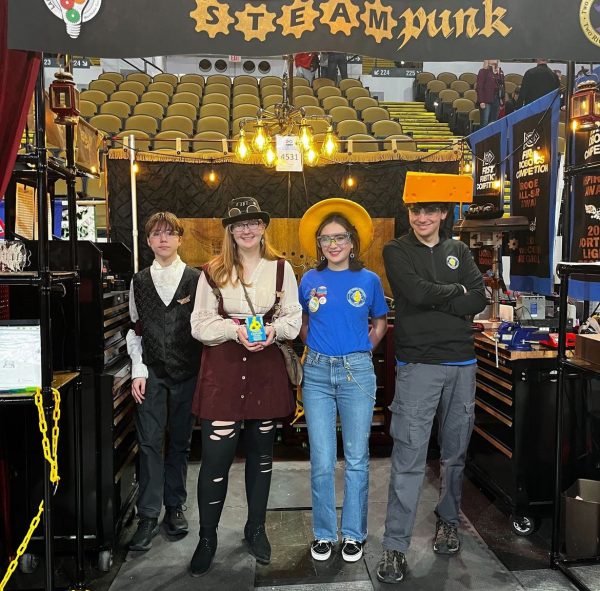Sophia Deak, senior, has spent the last several years channeling her skills into robotics competitions. According to Deak, she stumbled upon robotics in sixth grade as a result of her mother’s interest in engineering and hasn’t stopped since.
“The program I started doing was with FIRST (For Inspiration and Recognition of Science and Technology), which does various levels of robotics, starting with Lego robots for elementary schoolers,” Deak said. “Then, I progressed to larger teams.”
Deak says that her current robotics team, Milwaukee Cyber Cheese, formed in December of 2021, expanding as more members joined.
“We’re a community team from about 10 different schools around the Milwaukee area,” Deak said. “I joined slightly after it was formed. At first, it was just four students, and then we grew to about [10] students within that first month. We get together and have about three to four months to create a robot that’s about two-feet-by-two-feet and up to three feet high. It works with other teams’ robots to complete a task, like shooting a ball into a hoop. We split into groups for different focuses—outreach, business, marketing, mechanical, and electrical. Right now, we only have one person doing programming, but hopefully that changes. You also learn useful skills, like CAD modeling.”
The robotics competition season begins in January, with planning and preparation taking place beforehand. Deak plays a key role in this process.
“We recently got a head mentor, so we’re planning meetings to get mentors and captains together to structure the team differently this year,” Deak said. “Last year, we had around 15 people. This year, because a lot of people graduated, we’re at about three so far, but we haven’t opened up to new members yet. I’m the Safety Manager. This year, I’ll also be head of the mechanical team and one of the team captains.”

According to Deak, the official robotics game release is what kicks off the season. The team must follow the requirements laid out by FIRST throughout the process of building and programming their robot.
“We meet at the Milwaukee School of Engineering STEM Center with another team, watch the game video, and brainstorm ideas,” Deak said. “Then, we go through the rule book to figure out limitations. After that, we split into smaller groups to generate ideas, bring them back to the larger group, and sometimes our mentors veto things. We prototype and try to 3D model the robot. Last year, we 3D-modeled the entire thing quickly. We start by building the chassis, [which is] where the motors, electrical parts, and wheels go. If we have time, we make it look pretty and add sponsor panels; sometimes we make it look like cheese.”
Once the design, building, and programming of the robot are complete, the team competes at the FIRST Robotics Competition (FRC). Due to a smaller number of teams competing with larger robots, FRC doesn’t hold a state-level competition, with teams instead competing in regional competitions. Deak’s robotics team has found success at these regional-level competitions.
“In our second year, we won the Wisconsin regionals and had to scramble to get to Worlds in Houston,” Deak said. “This past year, we ranked 13th out of 30 to 40 teams [at nationals].”
According to Deak, the team has been able to find success despite challenges related to funding and member retention.
“For a team that’s only competed three times, we’ve done well,” Deak said. “Our biggest challenge is keeping people involved since our team isn’t affiliated with a school. Other teams, often sponsored by schools, charge fees, so people are more motivated to show up. We offer a free program at a third location, which makes it harder to keep people accountable. Last year, only six or seven people showed up regularly, and most of the work fell on a core group of three.”
Since the team doesn’t charge fees and isn’t associated with a school, they require outside sources for funding.
“We’re funded mostly through companies,” Deak said. “We send out cold call emails, letters, and apply to a lot of grants. The Milwaukee School of Engineering sponsors us by providing space, tools, and scrap metal. We also get mentors from them. Rockwell and Harley Davidson normally sponsor us, and Northwestern Mutual was on our shirts last year.
Deak says that preparing for competitions isn’t all the team does.
“We’ve also done side things like outreach events with STEM activities,” Deak said. “We’ve hosted events with speakers and brainstormed business ideas to raise money, since the robots cost a lot, around $20,000 or more each year.”
According to Deak, her robotics experiences have been rewarding, opening doors for her.
“You meet great people and find new opportunities,” Deak said. “I even got to participate in Make 48 because of people I met through robotics. If you’re willing to learn, it’s a great club to join.”

